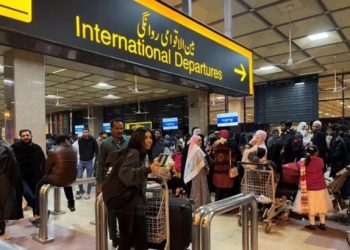Despite the official reopening of Pakistan’s airspace following a ceasefire agreement with India, flight operations across the country remained in disarray on Sunday, with over 150 flights cancelled due to ongoing uncertainty and logistical hurdles.
According to aviation sources, major international carriers scrapped around 125 inbound and outbound flights, leaving hundreds of passengers stranded. Karachi alone saw 45 flight cancellations, including 39 international services. Lahore experienced similar disruption, with 38 flights cancelled—32 of them international.
Islamabad faced the cancellation of 40 scheduled flights, 36 of which were international. Smaller airports also felt the impact, with 11 flights cancelled in Peshawar, 10 in Multan, and 6 in Sialkot. In contrast, only about 25 flights successfully operated across key airports in Karachi, Lahore, Islamabad, Multan, Faisalabad, and Quetta.
The widespread cancellations come even after Pakistan reopened its airspace on Saturday, following days of military escalation along the Line of Control (LoC) and a temporary airspace closure that began on May 7. The closure had been extended until May 11, but the announcement of a ceasefire led authorities to greenlight the resumption of flight operations.
However, challenges persist. The Rahim Yar Khan air corridor remains shut due to partial damage sustained during an Indian airstrike, and a NOTAM issued by aviation officials confirms it will remain closed until May 18. This has forced airlines, particularly those flying in from the Gulf region, to reroute through Quetta, causing significant delays and extended travel times.
The Pakistan Civil Aviation Authority (PCAA) is working to minimize further disruption, urging airlines to stay in constant contact with passengers and prioritize flight schedules, especially for Hajj operations. Despite these efforts, frustration continues to mount among international travelers grappling with unexpected delays and rerouted flights.
The airspace turmoil follows a volatile period of cross-border conflict that began on May 7, when India launched a strike resulting in the deaths of 31 Pakistani civilians. In retaliation, Pakistan downed five Indian Air Force jets. A ceasefire brokered by U.S. President Donald Trump was announced on May 10, but the operational aftershocks of the brief conflict are still being felt across Pakistan’s aviation sector.




































